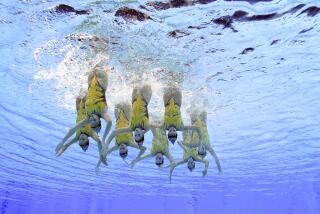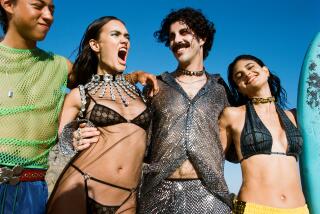Korea’s ‘Henyo’ Divers : Masters of the Sea--but 2nd Class on Land
SHINYANG, South Korea — One day before bearing her third child, Kim Chun Hwa made a small concession to maternity. She took a break from her grueling routine of diving in the frigid waters for sea urchin, octopus and abalone.
She was back in her wet suit two weeks later, though, leaving her infant daughter at home to join other village women harvesting the fertile seabeds with primitive tools and lung power.
That was 13 years ago, not long after the heyday of the henyo , literally the “women of the sea.” Kim, now 51, is one of a dwindling number of rugged women who still dive for a living from the coastal villages of South Korea’s Cheju Island.
Mermaids or Amazons
They are likened to mermaids, or Amazons. They are romanticized by feminists, fussed over by anthropologists and exploited by the government as tourist bait. But few of the henyo --pronounced “hen-yaw”--have any illusions about the backbreaking, ear-popping, women-only vocation that has been handed down through the generations on idyllic Cheju Island.
It is a difficult life, and Kim does not wish it on her daughters, even if the alternative is to forgo the relative economic independence she has enjoyed and submit themselves fully to South Korea’s mainstream culture of male domination. She would not mind if diving women disappeared altogether.
“I’d have no regrets,” Kim said over a dinner of sea urchin soup and spicy stewed octopus, part of the day’s catch. “We all feel the same way. Why should we be sorry to see something go away that causes so much hardship? If I didn’t need the money, I’d quit today.”
Indeed, a close look at the lives of the Cheju divers reveals a not-so-liberated state of affairs, illustrating how daunting a task it can be for a woman to assert herself in South Korea’s conservative, Confucian society.
Although the henyo are usually the primary breadwinners in their families, they are obliged to contribute 10% to 20% of their income to support patrilineal ancestor rituals, presided over by the comparatively indolent men of the village.
The women have little control over what is left, deferring to husbands, sons and other male relatives on major financial decisions, and sometimes retaining only a limited part of the assets they accumulate. The divers may enjoy far more autonomy than their counterparts on the mainland, but they have little chance to flaunt it.
Despite her prowess at sea, Kim’s very identity on land is derived from her oldest son, Deok Il, 22, whom she raised alone after her marriage broke up and whom she put through technical college. In keeping with traditional mores, she is known in the village as “Deok Il’s mother.” The son is the legal head of her household.
A myth of gender-bending dates back to the earliest foreign accounts of Cheju, a volcanic island 50 miles off the southern tip of the Korean Peninsula used by Yi Dynasty authorities as a penal colony.
William Franklin Sands, a U.S. consular official stationed in Seoul at the turn of the century, noted in his book, “Undiplomatic Memories,” that Cheju--known to him as Quelpart--was marked as “the Isle of Women” on old Chinese and Japanese maps. He described the women’s diving skills in admiring terms and left a somewhat ludicrous record of their social dominance.
“Man, in this lost corner of the world, was an inferior being; the woman was everything,” Sands wrote. “It was more like a matriarchy, a real Amazon community, for the women were always ready to assert their power and uphold it by force.”
The idea still persists that Cheju has a kind of reverse-role subculture, a matriarchy that belies the male chauvinism of Korean society. So Yong Park, a Korean-American anthropology student who came to Shinyang to do field work in 1987, said she had planned to study how the village was making a transition from a matriarchal to a patriarchal society. She was disappointed.
“As it turned out, there wasn’t anything like a matriarchy here at all,” Park said. “I found that out on the first day.”
Park learned that the men were running things, even the fishing cooperative that sold the women’s catch, and took a 10% cut. Maybe a few of them watched the children while their wives went diving, but in general the men of Shinyang tended to be “pompous and self-important,” Park said.
“It’s a highly Confucian society with a pocket of women’s culture off to the side,” she said.
Yet Park became enthralled by the earthy sisterhood of the divers. For a year she listened to their songs and monitored their banter as they gathered in the shelter of stone fences to change into black rubber wet suits in the morning and clean their catch in the evening. She noted their complaints about rough seas, cold water, bad husbands, aching bodies. Vulgar jokes were second only to talk of kosaeng : suffering, the hard life.
“The henyo lead two separate lives,” said Han Lim Hoa, a novelist in Cheju City who grew up in a neighboring village and has written several books on the divers. “When they are diving, they have their own social order based on camaraderie among women. But when they go home, they re-enter the world of men. There’s no carry-over from one to the other.”
On a recent afternoon, Kim, or Deok Il’s mother, and a group of a dozen other divers had just spent about five hours in the water and were busy crushing purple sea urchins with blunt knives and scooping the orange meat into plastic containers.
Asked why men eschew diving, the women had a variety of answers. The men are a little lazy. They are less tolerant of the cold water. It never occurred to them to dive. They aren’t as tough as women.
“They don’t want to dive because they’re afraid they’ll shrivel up,” said one henyo , eliciting cackles of laughter from the women squatting on the rocky beach.
It was a fair catch that day. Deok Il’s mother figured she hauled in $36 worth of sea urchin and shellfish, which is about average. She makes $600 to $700 diving 20 days a month, considerably more than the wages of many factory workers in South Korea and nearly twice what her eldest daughter makes as a nurse’s aide in Seoul. But she is concerned about the size of the urchins, which are getting smaller, a sign that they are being depleted.
“I’m worried,” said Deok Il’s mother, who started diving at age 13. “But if I don’t catch them now, I won’t make any money at all.”
Indeed, the overall catch is declining for Cheju’s divers, from about 25,000 tons in 1985 to 21,000 tons last year, according to a report by Yonhap News Service.
With prime seabeds being depleted, women are swimming farther out from shore with their Styrofoam buoys, and diving deeper for the elusive abalone and other game. Dives of about 20 feet used to suffice; now women are going as deep as 40 or 50 feet, staying under for several minutes at a time.
The henyo are also getting older, making it an increasingly hazardous line of work. The Yonhap report suggested that serious accidents, some of them fatal, have been increasing dramatically in recent years. The women say more and more divers have become addicted to painkillers trying to cope with the debilitating effects of water pressure on their ears and sinuses. Many, like Deok Il’s mother, are going deaf.
“Unless we really do something for the divers, they are endangered,” said Cho Hae Joang, an anthropologist at Yonsei University who has studied the henyo .
Because their daughters no longer join the trade, their numbers are declining rapidly. The divers’ ranks peaked at about 24,000 around 1970, but now officials count only 6,313, and 40% of them are over 50. Shinyang, a village with a population of about 1,250, has 80 divers. The youngest is in her early 30s, the oldest is over 70. (“Grandmother” divers stay near the surface gathering seaweed.)
Men Fight Back
The men of Shinyang, meanwhile, are trying to buck a reputation for idleness. But old attitudes die hard.
One man told Park he thought women were better suited for intensive farm labor, which is expected even of the divers, because “their knees are specially designed for squatting.” Another male villager suggested that women are natural divers because they are endowed with more body fat to ward off hypothermia in the water.
But Kim Yong Wook, 40, head of Shinyang’s village youth association, who runs a small variety store and grows hot-house pineapples, said that Cheju men are becoming industrious these days. They might even try their hand at diving, he said, if more modern, scientific techniques could be applied, such as scuba gear, which is currently outlawed.
“We’ve been treated unfairly,” he said. “I think the anthropologists have looked at things from a very superficial point of view. It’s not that men were lazy, they simply had nothing to do in the past. It was like unemployment.”
With their conspicuous economic status, the diving women of Cheju have become particularly attuned to handling the fragile masculine ego. Expertise in this area was clearly demonstrated when a male reporter recently donned a wet suit and joined Deok Il’s mother and her group in the water, where the women hyperventilated with the eerie whistling sounds that are characteristic of the henyo.
Unable to keep pace with the superbly conditioned athletes, the visitor flailed pathetically at the reef trying to hook sea urchins without destroying them--and ran out of breath every time. Before he knew it, though, Deok Il’s mother had secreted a dozen urchins in his game net, offering him a chance to save face.
Another diver staged an abalone catch for the inept man, prompting him to pry the mollusk loose with a blade she had inserted, then rise to the surface with the prize in hand as she orchestrated cheers by the other women. For a fleeting, blind moment, he was flush with a sense of accomplishment.
Schoenberger, Times’ Tokyo correspondent, was recently on assignment in South Korea.
More to Read
Sign up for Essential California
The most important California stories and recommendations in your inbox every morning.
You may occasionally receive promotional content from the Los Angeles Times.










